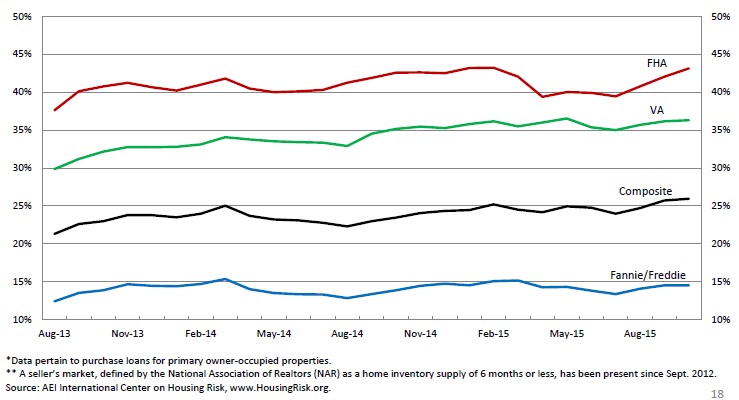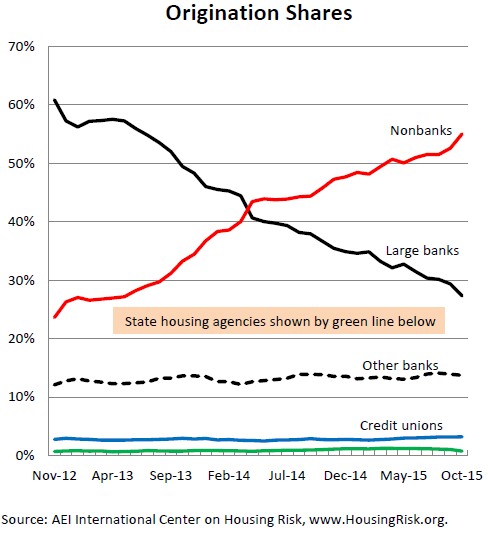Tuesday night I saw the trailer for The Big Short, which is based upon the book about John Paulson who made close to $4 B on the mortgage crisis by buying insurance contracts on subprime mortgages. It looks like it’s going to be a great movie and I loved how they used Led Zeppelin’s When The Levee Breaks (my favorite track from LZ IV, which got left in the dust by the much more popular track from that album) in the trailer. However, it reminded me that there is some data floating around that suggests that lenders are placing risky bets once again by lending too much money to unqualified borrowers. And if this is true are we heading towards another mortgage crisis? Maybe I can buy some credit default swaps this go round.
The data I’m talking about comes from an in-depth report from the American Enterprise Institute whose National Mortgage Risk Index supposedly tracks…well…mortgage risk. They do that by modeling the default rate of recently originated mortgages under the conditions that existed when the housing market and the economy crashed. The headline from the November 23 Mortgage Risk Index release is that the October index rose by 0.76% from last year. Apparently “every month since January 2014” has been higher than the previous year.
But let’s put this data in perspective. When you look at the long term trend – see the black line in the graph below – it doesn’t look all that bad. And all the lines seem to have flattened out in the last year or so.

Personally, I think some of the other data in the report is more alarming. For instance, there is a long term and continuing trend of an increase in the percentage of mortgages that are being made above a 43% debt to income ratio.
I was also disturbed by the fact that 58% of all mortgages were with down payments of 5% or less. That seems like a huge number. The only good news here is that that percentage has actually declined a bit in the last few months and hasn’t really changed that much in the last 3 years.
One of the more dramatic changes that the AEI is fretting about is that nonbanks are originating a greater and greater share of mortgages at the expense of large banks. The reason they are concerned about this is that the large banks have more conservative lending standards.
While I understand their concern the risk data doesn’t seem to support the notion that the nonbanks are throwing a wild party just yet.
So, what does all this mean for the housing market? It depends. If wildly generous lending is goosing demand for housing and driving up prices then we could be inflating another bubble. For instance, one of the slides in their presentation points out that during the bubble higher income leverage effectively increased home purchasing power by 46%. But it sure doesn’t feel like any of this is happening in Chicago right now.
Nevertheless, high debt to income mortgages are making it more likely that homeowners will default on their mortgages if they develop financial hiccups. And low down payment mortgages also make defaults more likely because a small decline in property values puts the homeowner underwater and eliminates their incentive to maintain the home or to conduct an orderly sale if they suddenly have to move.
If these troublesome trends continue all of these factors could drive a resurgence of distressed property sales, which brings down property values for all of us. The only thing that could be different this time is that home prices are still at a much lower level than at the peak so they don’t have as far to fall.
#RealEstate #MortgageCrisis
Gary Lucido is the President of Lucid Realty, the Chicago area’s full service discount real estate brokerage. If you want to keep up to date on the Chicago real estate market, get an insider’s view of the seamy underbelly of the real estate industry, or you just think he’s the next Kurt Vonnegut you can Subscribe to Getting Real by Email using the form below. Please be sure to verify your email address when you receive the verification notice.

